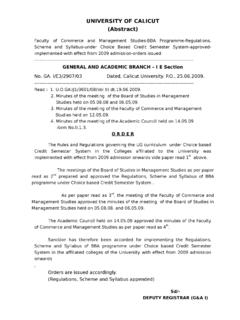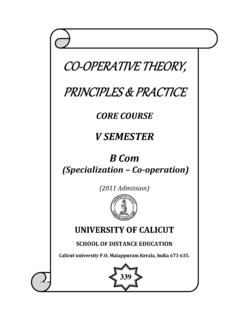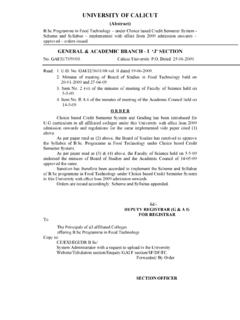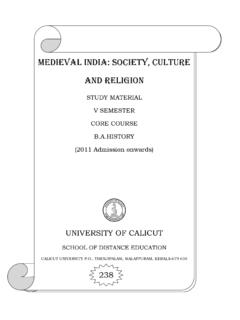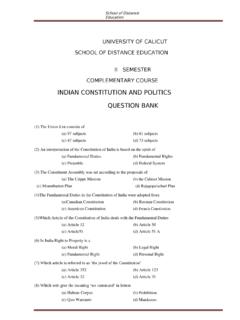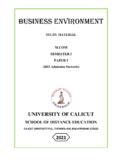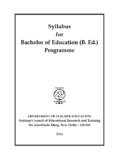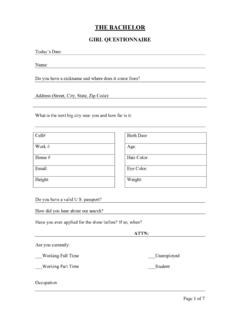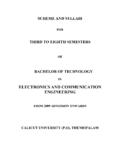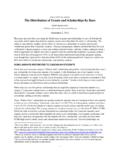Transcription of BACHELOR OF TECHNOLOGY - University of Calicut
1 SCHEME AND SYLLABI. FOR. THIRD TO EIGHTH SEMESTERS. OF. BACHELOR OF TECHNOLOGY . IN. CIVIL ENGINEERING. ( part time ). FROM 2009 ADMISSION ONWARDS. Calicut University ( ), THENHIPALAM. SCHEME OF STUDIES AND SYLLABUS FOR B. TECH DEGREE ( part - time ). III to VIII SEMESTERS 2009 SCHEME. Third Semester Sl. Code Subject Hours / week Marks Sem-end Credits No L T P/D Inte- Sem- Duration rnal end Hours 1 PTEN09 301 Engineering Mathematics III 2 1 - 30 70 3 4. 2 PTCE09 302 Mechanics of Solids 3 1 - 30 70 3 5. 3 PTCE09 303 Building TECHNOLOGY I 2 1 - 30 70 3 4. 4 PTCE09 304 Surveying I 2 1 - 30 70 3 4. 5 PTCE09 305 Engineering Geology 2 1 - 30 70 3 4. 6 PTCE09 306(P) Surveying Lab I - - 2 50 50 3 2. 7 PTCE09 307(P) Materials Testing Lab I - - 2 50 50 3 2. Total 11 5 4 25. Fourth Semester Sl. Code Subject Hours / week Marks Sem-end Credits No L T P/D Inte- Sem Duration rnal -end Hours 1 PTEN09 401 A Engineering Mathematics IV 2 1 - 30 70 3 4.
2 2 PTCE09 402 Fluid Mechanics 3 1 - 30 70 3 5. 3 PTCE09 403 Structural Analysis I 2 1 - 30 70 3 4. 4 PTCE09 404 Engineering Economics & 2 1 - 30 70 3 4. Principles of Management 5 PTCE09 405 Surveying II 2 1 - 30 70 3 4. 6 PTCE09 406(P) Surveying Lab II - - 2 50 50 3 2. 7 PTCE09 407(P) Civil Engineering Drawing I - - 2 50 50 3 2. Total 11 5 4 25. Fifth Semester Sl. Code Subject Hours / week Marks Sem-end Credits No L T P/D Inte- Sem- Duration rnal end Hours 1 PTCE09 501 Transportation Engineering I 2 1 - 30 70 3 5. 2 PTCE09 502 Structural Design I 2 1 - 30 70 3 4. 3 PTCE09 503 Open Channel Hydraulics & 2 - - 30 70 3 4. Hydraulic Machinery 4 PTCE09 504 Geotechnical Engineering I 2 1 - 30 70 3 4. 5 PTCE09 505 Structural Analysis II 2 1 - 30 70 3 4. 6 PTCE09 506 Building TECHNOLOGY II 1 1 - 30 70 3 3. 7 PTCE09 507(P) Civil Engineering Drawing II - - 2 50 50 3 2. 8 PTCE09 508(P) Fluid Mechanics Lab - - 2 50 50 3 2.
3 Total 11 5 4 28. Sixth Semester Sl. Code Subject Hours / week Marks Sem-end Credits No L T P/ Inte- Sem- Duration D rnal end Hours 1 PTCE09 601 Hydrology & Irrigation 2 1 - 30 70 3 5. Engineering 2 PTCE09 602 Structural Design II 2 1 - 30 70 3 4. 3 PTCE09 603 Structural Analysis III 2 1 - 30 70 3 4. 4 PTCE09 604 Geotechnical Engineering II 2 1 - 30 70 3 4. 5 PTCE09 605 Transportation Engineering II 2 - - 30 70 3 3. 6 PTCE09 Lxx Elective I 2 1 - 30 70 3 4. 7 PTCE09 607(P) Geotechnical Engineering Lab - - 2 50 50 3 2. 8 PTCE09 608(P) Materials Testing Lab II - - 2 50 50 3 2. Total 12 4 4 28. Electives I. PTCE09 L01 Advanced Mechanics of Materials PTCE09 L02 Traffic Engineering PTCE09 L03 Maintenance and Repair of Buildings PTCE09 L04 Computer Applications and Operations Research PTCE09 L05 Functional Design of Buildings Seventh Semester Sl. Code Subject Hours / week Marks Sem-end Credits No L T P/D Inte- Sem- Duration rnal end Hours 1 PTCE09 701 Structural Design III 2 1 - 30 70 3 5.
4 2 PTCE09 702 Design of Hydraulic 2 1 - 30 70 3 4. Structures 3 PTCE09 703 Environmental Engineering I 2 - - 30 70 3 3. 4 PTCE09 704 Construction Engineering & 2 - - 30 70 3 3. Management 5 PTCE09 Lxx Elective II 2 1 - 30 70 3 4. 6 PTCE09 Lxx Elective III 2 - - 30 70 3 4. 7 PTCE09 707(P) Computer Applications Lab - - 2 50 50 3 2. 8 PTCE09 708(P) Environmental Engineering - - 2 50 50 3 2. Lab 9 PTCE09 709(P) Project - - 1 100 - 3 1. Total 12 3 5 28. Eighth Semester Sl. Code Subject Hours / week Marks Sem-end Credits No L T P/D Inte- Sem- Duration rnal end Hours 1 PTCE09 801 Environmental Engineering II 2 1 - 30 70 3 5. 2 PTCE09 802 Quantity Survey & Valuation 2 1 - 30 70 3 3. 3 PTCE09 803 Elective IV 2 1 - 30 70 3 4. 4 PTCE09 804 Elective V 2 1 - 30 70 3 4. 5 PTCE09 805(P) Seminar - - 2 100 - 3 2. 6 PTCE09 806(P) Project - - 6 100 - 3 7. 7 PTCE09 807(P) Viva Voce - - - - 100 3 3. Total 8 4 8 28.
5 Electives for 7th and 8th Semesters PTCE09 L06 Advanced Structural Design I. PTCE09 L07 Advanced Structural Design II. PTCE09 L08 Advanced Geotechnical Engineering I. PTCE09 L09 Advanced Geotechnical Engineering II. PTCE09 L10 Highway Pavement Design PTCE09 L11 Ecology and Environmental Chemistry PTCE09 L12 Industrial Structures PTCE09 L13 Structural Dynamics & Seismic Design PTCE09 L14 Soil Exploration, Testing and Evaluation PTCE09 L15 Surface Hydrology and Water Power PTCE09 L16 Urban Transportation Planning PTCE09 L17 Architecture and Town Planning PTCE09 L18 Advanced Construction Engineering and Management PTCE09 L19 Coastal Engineering & Marine Structures PTCE09 L20 Ground Water Hydrology PTCE09 L21 Ground Improvement Techniques PTCE09 L22 Environmental Pollution Control Engineering*. PTCE09 L23 Experimental Stress Analysis*. PTCE09 L24 Remote Sensing and GIS*. PTCE09 L25 Finite Element Methods*.
6 Global Electives CS09 L24 Computer Based Numerical Methods PE09 L24 Industrial Psychology PE09 L25 Entrepreneurship ME09 L22 QUALITY ENGINEERING AND MANAGEMENT. ME09 L25 Energy Engineering and Management ME09 L23 Industrial Safety Engineering AN09 L24 Project Management CH09 L24 Industrial Pollution Control EC09 L23 Data Structures and Algorithms EE09 L22 Soft Computing Techniques ------------------------ PT EN09 301: Engineering Mathematics III. (Common for all branches). Teaching scheme Credits: 4. 2 hours lecture and 1 hour tutorial per week Objective This course provides a quick overview of the concepts and results in complex analysis that may be useful in engineering. Also it gives an introduction to linear algebra and Fourier transform which are wealth of ideas and results with wide area of application. Module I: Functions of a Complex Variable (13 hours). Functions of a Complex Variable Limit Continuity Derivative of a Complex function Analytic functions Cauchy-Riemann Equations Laplace equation Harmonic Functions Conformal Mapping Examples: Zn, sinz, cosz, sinhz, coshz, (z+1/Z ) Mobius Transformation.
7 Module II: Functions of a Complex Variable (14 hours). Definition of Line integral in the complex plane Cauchy's integral theorem (Proof of existence of indefinite integral to be omitted) Independence of path Cauchy's integral formula Derivatives of analytic functions (Proof not required) Taylor series Laurent series Singularities and Zeros . Residues Residue Integration method Residues and Residue theorem Evaluation of real integrals. Module III: Linear Algebra (13 hours) - Proofs not required Vector spaces Definition, Examples Subspaces Linear Span Linear Independence Linear Dependence Basis Dimension Ordered Basis Coordinate Vectors Transition Matrix . Orthogonal and Orthonormal Sets Orthogonal and Orthonormal Basis Gram-Schmidt orthogonolisation process Inner product spaces Examples. Module IV: Fourier Transforms (14 hours). Fourier Integral theorem (Proof not required) Fourier Sine and Cosine integral representations.
8 Fourier Transforms Fourier Sine and Cosine Transforms Properties of Fourier Transforms. Text Books Module I: Erwin Kreysig, Advanced Engineering Mathematics, 8e, John Wiley and Sons, Inc. Sections: , , , , , Module II: Erwin Kreysig, Advanced Engineering Mathematics, 8e, John Wiley and Sons, Inc. Sections: , , , , , , , , Module III: Bernaed Kolman, David R Hill, Introductory Linear Algebra, An Applied First Course, Pearson Education. Sections: , , , , , , Module IV: Wylie and Barrett, Advanced Engineering Mathematics, McGraw Hill. Sections: , , Reference books 1. H S Kasana, Complex Variables, Theory and Applications, 2e, Prentice Hall of India. 2. John M Howie, Complex Analysis, Springer International Edition. 3. Shahnaz bathul, Text book of Engineering Mathematics, Special functions and Complex Variables, Prentice Hall of India. 4. Gerald Dennis Mahan, Applied mathematics, Springer International Edition.
9 5. David Towers, Guide to Linear Algebra, MacMillan Mathematical Guides. 6. Howard Anton, Chris Rorres, Elementary Linear Algebra, Applications Version, 9e, John Wiley and Sons. 7. Anthony Croft, Robert Davison, Martin Hargreaves, Engineering Mathematics, 3e, Pearson Education. 8. H Parthasarathy, Engineering Mathematics, A Project & Problem based approach, Ane Books India. 9. B V Ramana, Higher Engineering Mathematics, McGrawHill. 10. Sarveswara Rao Koneru, Engineering Mathematics, Universities Press. 11. J K Sharma, Business Mathematics, Theory and Applications, Ane Books India. 12. John bird, Higher Engineering Mathematics, Elsevier, Newnes. 13. M Chandra Mohan, Vargheese Philip, Engineering Mathematics-Vol. I, II, III & IV., Sanguine Technical Publishers. 14. N Bali, M Goyal, C Watkins, Advanced Engineering Mathematics, A Computer Approach, 7e, Infinity Science Press, Fire Wall Media.
10 15. V R Lakshmy Gorty, Advanced Engineering Mathematics-Vol. I, II., Ane Books India. 16. Sastry , Advanced Engineering Mathematics-Vol. I and II., Prentice Hall of India. 17. Lary C Andrews, Bhimsen K Shivamoggi, Integral Transforms for Engineers, Prentice Hall of India. Internal Continuous Assessment (Maximum Marks-30). 60% - Tests (minimum 2). 30% - Assignments (minimum 2) such as home work, problem solving, group discussions, quiz, literature survey, seminar, term-project, software exercises, etc. 10% - Regularity in the class University Examination Pattern part A: Short answer questions (one/two sentences) 5 x 2 marks=10 marks All questions are compulsory. There should be at least one question from each module and not more than two questions from any module. part B: Analytical/Problem solving questions 4 x 5 marks=20 marks Candidates have to answer four questions out of six. There should be at least one question from each module and not more than two questions from any module.
